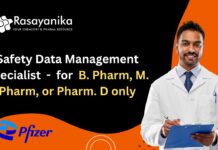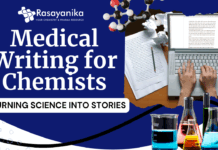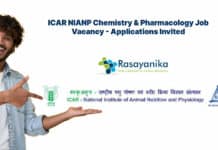Research Scientist Job for M.Pharm/M.Sc Candidates at Piramal Pharma
Research Scientist Job for M.Pharm/M.Sc Candidates at Piramal Pharma Ltd. Interested Candidates can check out the details below and Apply Online.
Job title: Research Scientist
Job Location: Ahmedabad, Gujarat, India
Job id: 2882
Job Category: Analytical Development
Job Type: Full Time
JOB DESCRIPTION
- Should have hands on experience of analytical instruments (HPLC, GC, IR, UV, Dissolution, Particle Size, KF analyzer etc)
- Review of electronic data and audit trail
- Monitoring compliance in laboratory as per laid down procedures
- Review of analytical records (instrument logbooks, calibration records, standard management records etc.)
- Review of analytical method validation protocols and reports
- Investigation of QMS – OOS, Deviation, Incident, OOT
- Review of quality event and trending preparation
- Review of specifications and analytical test methods
- Review of QC SOPs for compliance requirements and continual improvement
- Knowledge of computer system validation of analytical instruments
- Installation and qualification of analytical instrument
- Good understanding on computer system validation
- Good understanding on Data integrity, GMP, and GLP practices
- To follow the compliance of the system within the department
- Review of external calibration certificates
QUALIFICATIONS
- M.Pharm/M.Sc
Here are five Possible interview questions along with sample answers for the position of Research Scientist in Analytical Development:
1. Question: The job description mentions hands-on experience with various analytical instruments. Can you provide specific examples of your experience working with HPLC, GC, or other analytical instruments?
Answer: In my previous role as a Research Scientist, I had extensive hands-on experience with a range of analytical instruments, including HPLC, GC, IR, UV, Dissolution, Particle Size, and KF analyzer. For instance, I routinely used HPLC to analyze complex pharmaceutical compounds, ensuring accurate and reliable results. I also operated GC for volatile compound analysis. My proficiency with these instruments allowed me to contribute effectively to analytical development projects and maintain high-quality standards in the laboratory.
2. Question: The job description emphasizes the review of electronic data and audit trails. Can you share an example of a situation where you conducted a thorough review of electronic data and identified an issue or discrepancy? How did you handle it?
Answer: Certainly. In a recent project, I was tasked with reviewing electronic data from an analytical instrument. During the review, I noticed a discrepancy between the instrument logbook and the calibration records, which raised concerns about data accuracy. I immediately initiated an investigation, working closely with the team. We identified the root cause, rectified the calibration issue, and documented the corrective actions taken. This incident highlighted the importance of rigorous data review and the proactive approach we follow to maintain data integrity.
3. Question: The job description mentions knowledge of computer system validation of analytical instruments. Can you explain your experience in computer system validation and its significance in analytical development?
Answer: Computer system validation is crucial in analytical development to ensure data integrity and compliance with regulatory standards. I have experience in validating computer systems associated with analytical instruments. This includes defining user requirements, conducting risk assessments, and executing validation protocols. Through these activities, I ensure that the software and data processing functions of analytical instruments are reliable and compliant. This validation process guarantees the accuracy and traceability of analytical results, which is vital in pharmaceutical research.
4. Question: The job requires a good understanding of GMP and GLP practices. Can you provide an example of how you have applied these practices in your previous role to maintain quality and compliance?
Answer: In my previous role, adherence to GMP (Good Manufacturing Practices) and GLP (Good Laboratory Practices) was paramount to our work. One key example is our approach to sample handling. We implemented strict procedures for sample identification, storage, and documentation, following GMP and GLP guidelines. This ensured sample traceability, data reliability, and compliance with regulatory standards. This commitment to quality practices resulted in successful regulatory inspections and maintained the integrity of our analytical data.
5. Question: The job description mentions conducting investigations of quality events like OOS, Deviation, Incident, and OOT. Can you describe a challenging quality event you investigated, the steps you took to resolve it, and the outcomes?
Answer: Certainly. In a previous role, I encountered a challenging Out of Specification (OOS) event during a critical project. Upon discovering an unexpected result, I immediately initiated an investigation. The steps included a thorough review of the analytical method, equipment, and sample handling procedures. We also conducted reanalysis and performed instrument troubleshooting. Through a collaborative effort, we identified the root cause as a calibration issue with the analytical instrument. We implemented corrective actions, revalidated the method, and ensured that subsequent results met specifications. This incident highlighted our commitment to data integrity, quality, and problem-solving skills. It also reinforced the importance of a proactive approach to quality events in maintaining the reliability of analytical data.
Subscribe Rasayanika for more Chemistry and Pharma job updates.

















































